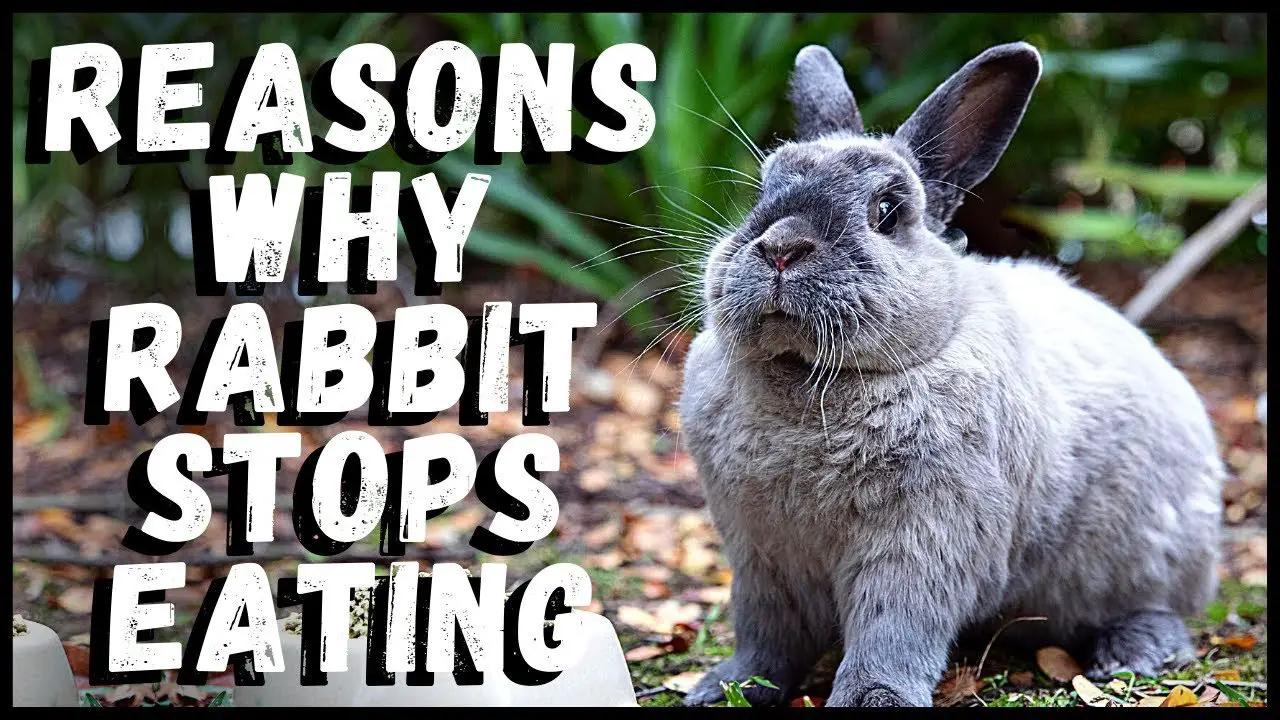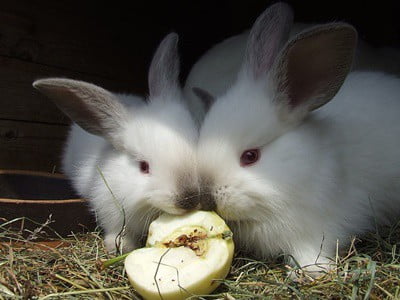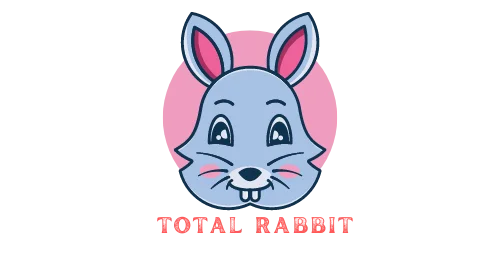What to Do If Your Rabbit Stops Eating

If your rabbit suddenly stops eating, it’s important to take action right away. There are many potential causes of anorexia in rabbits, so it’s important to consult with a veterinarian to rule out any medical conditions. If your rabbit is healthy but still not eating, there are several things you can try to encourage them to start eating again.
Offer your rabbit their favorite foods, provide fresh hay and vegetables, and make sure they have access to clean water at all times. You should also check for any dental problems that could be causing your rabbit pain when they eat. With a little patience and effort, you can usually get your rabbit eating again in no time.
If your rabbit stops eating, it’s important to take action quickly. Here are some things you can do:
1. Check for signs of illness.
If your rabbit is acting lethargic or seems ill, take them to the vet right away.
2. Make sure their food is fresh and appealing. Sometimes rabbits can be picky eaters, so try offering them a variety of fresh foods to see if that helps.
3. Provide plenty of hay. Hay is an important part of a rabbit’s diet, so make sure they have plenty of fresh hay available at all times.
4. Offer water regularly.
Make sure your rabbit has access to fresh water at all times and offer them water regularly throughout the day.
My Rabbit is Hiding And Not Eating
If your rabbit is hiding and not eating, there are a few possible explanations. It could be sick, stressed, or simply adjusting to a new environment. If your rabbit has been hiding for more than a day and isn’t eating, it’s important to take them to the vet to rule out any medical problems.
There are several things that can stress out a rabbit, such as loud noises, changes in their routine, or being around other animals. If you think your rabbit is stressed, try to make their environment as calm and quiet as possible. You can also offer them favorite foods or toys to help ease their anxiety.
Sometimes rabbits will hide when they’re first introduced to a new home. This is normal behavior and they should eventually come out on their own. Make sure they have plenty of food and water available, and give them some time to adjust before handling them too much.
Rabbit Not Eating But Acting Normal
If your rabbit isn’t eating but is acting normal, there are a few possible explanations. It could be that they’re not feeling well and have lost their appetite, or there could be something wrong with their diet. If you’re concerned about your rabbit’s health, it’s always best to consult with a veterinarian.
There are a few things you can do to try and get your rabbit eating again. Make sure they have access to fresh water at all times, as dehydration can make them feel even worse. You can also try offering them small amounts of their favorite foods or treats to see if that entices them to eat.
If nothing seems to work, it’s best to bring them in for a check-up so the vet can rule out any underlying health issues.
Home Remedy for Rabbit Not Eating
If your rabbit is not eating, there are a few things you can do to try and get them back on track. First, check that they have access to fresh water at all times. Next, give them some hay to nibble on – this will help with their digestion.
Finally, try offering them a variety of healthy foods to see what they will eat. If all else fails, take them to the vet to make sure there isn’t an underlying health issue causing their lack of appetite.
My Rabbit is Laying down And Not Eating
If your rabbit is lying down and not eating, there are a few potential causes. It could be something as simple as indigestion or gas, or it could be a more serious issue like gastrointestinal stasis. If your rabbit is otherwise healthy and has no other symptoms, you can try giving them a teaspoon of olive oil to help with their digestive system.
However, if they continue to lie down and refuse food, it’s best to take them to the vet for an examination.
Gastrointestinal stasis is a serious condition that can occur in rabbits when their digestive system slows down or stops working properly. This can happen for various reasons, including stress, pain, dehydration, or an obstruction in the intestines.
If not treated promptly, gastrointestinal stasis can be fatal. Symptoms include lack of appetite, lethargy, bloating, and soft droppings. If you think your rabbit may have gastrointestinal stasis, take them to the vet immediately!
Why is My Rabbit Not Eating Pellets
If you have a pet rabbit, you may be wondering why they’re not eating their pellets. There are a few reasons this could be happening. First, your rabbit may not be used to pellets and is still getting used to the taste and texture.
It’s important to introduce new foods slowly so that your rabbit can get accustomed to them. If you’ve just started feeding your rabbit pellets, give them time to get used to the new food.
Another reason your rabbit may not be eating pellets is that they’re not getting enough hay.
Hay is an important part of a rabbits diet and should make up the majority of their diet. If your rabbit isn’t eating enough hay, they may not be interested in pellets because they’re already getting all the nutrients they need from the hay. Make sure you’re giving your rabbit plenty of fresh hay each day and see if that makes a difference in their appetite for pellets.
There are also some health conditions that can cause rabbits to lose their appetite for food, including dental problems or GI issues. If you think there’s a chance your rabbit might be sick, it’s always best to take them to the vet for an exam just to be sure.
If you’ve tried all of these things and your rabbit still isn’t interested in eating pellets, don’t worry!

Credit: www.rabbitcaretips.com
How Do I Get My Rabbit to Eat Again?
If your rabbit has stopped eating or is eating less, the first thing you should do is talk to your veterinarian. There are many possible causes of anorexia in rabbits, ranging from minor issues like stress to more serious problems like gastrointestinal disease. Your vet will be able to help you figure out what’s going on and how to best treat it.
There are a few things you can do at home to encourage your rabbit to eat again. First, make sure that they have access to fresh water at all times. Next, try offering them their favorite foods or treats.
If they’re still not interested in eating, syringe feeding may be necessary. This should only be done under the guidance of a veterinarian though, as it can be easy to do incorrectly and cause more harm than good.
With proper treatment from your veterinarian and some patience, your rabbit should start eating again soon!
How Long Can a Rabbit Go Without Eating?
Assuming you are referring to a healthy, adult rabbit:
A healthy, adult rabbit can go for several days without eating. However, if a rabbit stops eating for more than two days, it becomes at risk for developing GI stasis, which is a potentially life-threatening condition.
Therefore, if your rabbit stops eating or appears to be off its food for more than 24 hours, you should take it to the vet as soon as possible.
Do Rabbits Stop Eating When They are in Pain?
Yes, rabbits do stop eating when they are in pain. When a rabbit is sick or injured, it will often go off its food. This is because eating takes energy and the rabbit needs to conserve its energy to heal itself.
If your rabbit has stopped eating, it is important to take it to the vet so that the cause can be found and treated.
Things to Do If Your Rabbit Stops Eating
Should I Worry If My Rabbit Gets Wet and Stops Eating?
If you notice your pet rabbit getting wet and suddenly losing its appetite, it could be a cause for concern. Rabbits are highly sensitive to changes in temperature and can experience hypothermia if they become drenched. In such cases, it is important to dry your rabbit gently and provide a warm, cozy environment. If your rabbit continues to display appetite loss or shows any other concerning signs, consult a veterinarian promptly for proper care and advice.
Conclusion
If your rabbit stops eating, there are a few things you can do to try and get them back on track. First, check to see if there is anything that might be causing them stress or discomfort. If you can’t find anything, try offering them a variety of foods to see if anything sparks their appetite.
You can also try giving them some supplements to help boost their nutrition. If all else fails, consult with a veterinarian to rule out any medical conditions that may be causing the problem.
